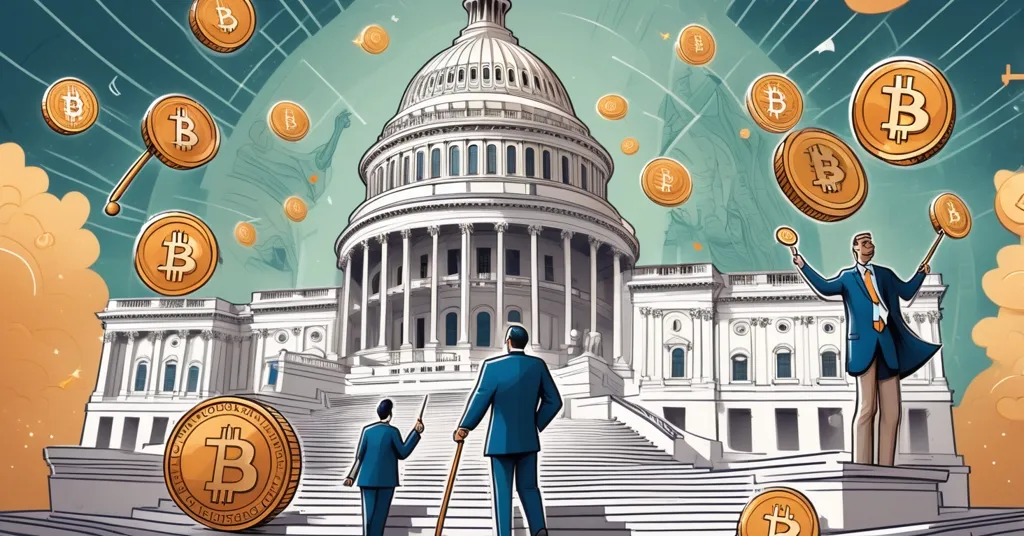U.S. Senators Push CFTC Oversight in Groundbreaking Crypto Regulation Bill

U.S. Senators Propose CFTC Oversight in Major Crypto Regulation Bill
A groundbreaking bipartisan push in the U.S. Senate could finally bring order to the untamed frontier of crypto rules. Senators John Boozman (R-Ark.) and Cory Booker (D-N.J.) have introduced a draft bill through the Senate Agriculture Committee to grant the Commodity Futures Trading Commission (CFTC) primary oversight over digital commodities like Bitcoin and Ether, aiming to set clear standards for an industry desperate for regulatory clarity.
- Bipartisan Effort: Boozman and Booker cross party lines to regulate digital commodities.
- CFTC Focus: Proposes CFTC authority over cryptocurrencies not deemed securities.
- Key Standards: Sets rules for custody, transparency, and cybersecurity in crypto exchanges.
- Challenges Ahead: Token classification and agency disputes remain unresolved.
The Bill’s Core Proposals
The draft bill targets a long-standing pain point in the crypto space: the lack of a cohesive regulatory framework. By positioning the CFTC as the lead regulator for digital commodities—think Bitcoin and Ether, with a combined market cap in the hundreds of billions—it seeks to create a structured environment for exchanges. The CFTC, a federal agency traditionally overseeing futures and options markets (essentially contracts betting on future asset prices), would enforce strict standards. These include how user funds are held in custody to prevent theft or loss, transparency in trading to avoid hidden manipulation, and robust cybersecurity to fend off hacks that have plagued the industry for years. For exchanges, this means registering with the CFTC and proving they’re not just fly-by-night operations. For users, it’s a potential shield against another FTX-style collapse, where poor custody practices wiped out over $8 billion in investor funds in 2022. If implemented, these rules could force the industry to grow up fast, moving past the reckless speculation that’s burned so many.
Bipartisan Push and Political Context
What’s striking about this proposal is the rare alliance between Boozman, the Senate Agriculture Committee Chair, and Booker, a key Democrat. Crypto regulation often gets bogged down in partisan mudslinging, with one side decrying it as a scam and the other hyping it as the future of finance. This cross-party effort, as seen in the recent proposal for CFTC oversight of digital commodities, signals a shared urgency to act, especially as the market’s influence grows. The Senate Agriculture Committee oversees CFTC provisions, but the Senate Banking Committee handles securities law aspects, and separate Republican proposals are still in play. Getting alignment feels like trying to sync a dozen broken clocks. There’s also whispers of support tied to broader political agendas, with some linking the bill to former President Donald Trump’s focus on tech competitiveness and fraud prevention. Whether that’s genuine policy or just election-year noise, only time will tell. Still, bipartisan momentum gives this bill a fighting chance in a gridlocked Congress.
Challenges and Criticisms: CFTC vs SEC
Don’t get too excited yet—the road to passage is littered with landmines. The biggest snag is the turf war between the CFTC and the Securities and Exchange Commission (SEC). Picture two chefs arguing over who cooks the main dish: both claim the recipe, but their kitchens don’t mix. The SEC insists many tokens are securities—investment contracts under its jurisdiction—while the CFTC has historically treated Bitcoin and Ether as commodities in contexts like futures trading. This bill leans toward expanding the CFTC’s domain over digital commodities, but defining which tokens qualify is a legal mess. Does Solana count? What about Cardano? If a token gets labeled a security, developers could face crippling reporting rules under the SEC, while commodity status might offer more breathing room. Then there’s consumer protection, a glaring gap after disasters like Terra/Luna, which tanked in 2022, obliterating $40 billion in value overnight. Without ironclad safeguards, critics warn this framework risks being a paper tiger. Industry voices, meanwhile, just want predictability over perfection, tired of sudden penalties without warning.
Global Context: U.S. vs the World
Zooming out, the U.S. is playing catch-up in a global race for crypto dominance. The European Union’s Markets in Crypto-Assets (MiCA) regulation, set to roll out in 2024, already mandates reserve backing for stablecoin issuers and licensing for exchanges, creating a structured playground for innovation. Singapore, too, has positioned itself as a crypto hub with clear licensing rules under its Monetary Authority, attracting firms fleeing U.S. uncertainty. Meanwhile, American startups face a patchwork of state-by-state rules and federal ambiguity, often packing up for friendlier shores. If this bill stalls, the brain drain could accelerate, costing the U.S. talent and capital. The stakes aren’t just domestic—crypto is borderless, and lagging behind means ceding influence to regions that got their act together first. Boozman and Booker’s proposal is a chance to level the playing field, but it’s got to deliver substance, not just headlines.
Devil’s Advocate: Regulation vs Decentralization
Let’s flip the script for a second. Is shoving crypto under government oversight really the win everyone thinks it is? Bitcoin was forged in the ashes of the 2008 financial crisis, a middle finger to centralized control and bailed-out banks. Handing the reins to the CFTC might bring stability, but at what cost? We’re talking about a technology built to disrupt, not conform. Bureaucrats aren’t exactly speed demons—by the time they figure out DeFi, the next big thing will already be here. This could be good intentions paving a road to stifling red tape, choking the raw chaos that birthed billion-dollar ideas. As a Bitcoin maximalist, I see the upside of BTC being cemented as digital gold under commodity status, a clear win over speculative altcoin noise. But I’ll admit, Ethereum and its DeFi ecosystem tackle niches Bitcoin shouldn’t touch. Smothering those experiments, even the dumb ones, risks killing the golden goose. On the flip side, ignoring oversight invites more scams—some tokens are just Ponzi schemes with slicker branding. It’s a brutal balancing act.
What’s Next for Crypto Regulation?
Peering into the crystal ball, this bill could go either way. Best case? It passes with teeth, giving the U.S. a clear framework that boosts confidence—think more institutional money pouring into Bitcoin and legit projects thriving without fear of random crackdowns. Worst case? It flops or gets gutted into a meaningless compromise, leaving the industry in limbo while scams multiply and innovation bleeds overseas. Negotiations over token classification and consumer rules will be the make-or-break moment. Even if it passes, expect lawsuits and pushback from both overzealous regulators and anti-establishment crypto purists. For now, the community—hodlers, devs, and suits alike—will be glued to every update. One thing’s clear: the days of unchecked speculation are on borrowed time.
Key Takeaways and Questions on U.S. Crypto Regulation
- What does this bipartisan bill aim to achieve for cryptocurrencies?
It proposes the CFTC as the primary regulator for digital commodities like Bitcoin and Ether, enforcing standards for exchanges on custody, transparency, and cybersecurity to bring order to the market. - Why is the CFTC-SEC jurisdiction debate a major issue?
The conflict arises from disagreement over whether tokens are commodities (CFTC’s domain) or securities (SEC’s turf), creating confusion and regulatory overlap that could stall the bill’s impact. - Could this legislation strengthen the U.S. crypto industry?
Absolutely, by offering clarity, it could attract investment and keep innovation domestic, countering the exodus to crypto-friendly hubs like Singapore and the EU with established frameworks. - What are the risks of over-regulating crypto with this bill?
Heavy-handed rules might crush the decentralized spirit of crypto, burdening projects with bureaucracy that slow-moving agencies can’t adapt to in a fast-paced tech landscape. - Why is bipartisan support crucial for crypto regulation?
With crypto policy often polarized, this rare collaboration between Republicans and Democrats boosts the odds of passing meaningful laws that balance innovation with investor protection. - How might this bill impact Bitcoin’s status as digital gold?
Classifying BTC as a commodity reinforces its role as a store of value, a win for maximalists, though it may shift focus away from broader blockchain innovations like Ethereum’s DeFi.
For those just dipping their toes into crypto, here’s the basics: Bitcoin is the pioneer, a decentralized digital currency free from central banks, running on a peer-to-peer network. Ether powers Ethereum, a platform for smart contracts and decentralized apps, expanding beyond just money. Digital commodities, as targeted by this bill, are cryptocurrencies not classified as securities—unlike securities, which imply investment promises under SEC rules, commodities are more like raw assets (think gold or oil) under the CFTC. This distinction is why the bill matters so much.
Looking at the bigger picture, this proposal is a pivotal moment for U.S. crypto regulation in 2023. It’s a chance to anchor decentralization and financial freedom in a mainstream framework without losing what makes this space revolutionary. But the devils in the details—jurisdictional fights, protection gaps, and the risk of overreach—could still sink it. We’ll be tracking every move as this high-stakes drama unfolds, because whether it’s a triumph or a trainwreck, the outcome will shape the future of money itself.



